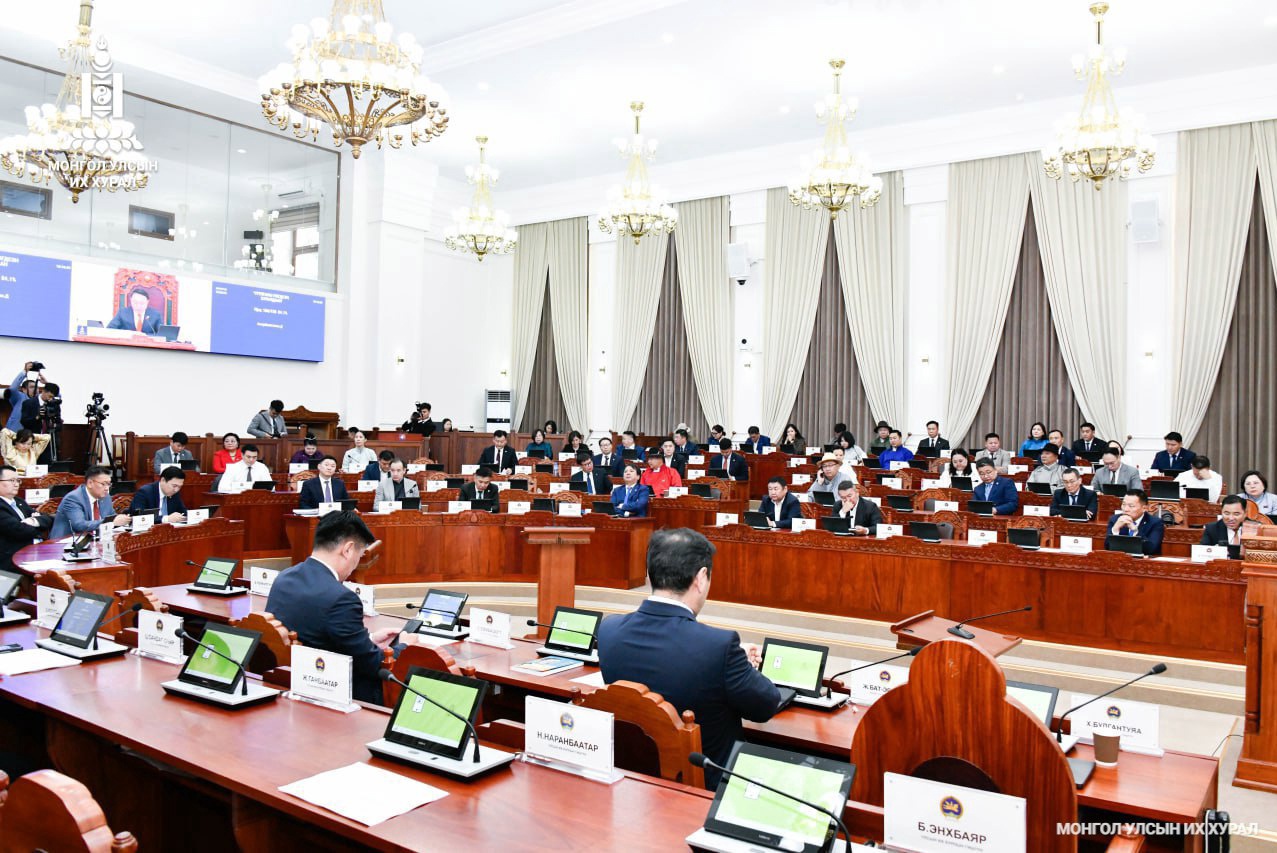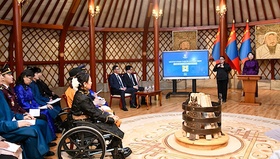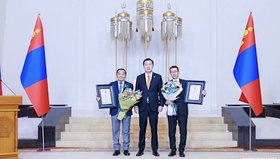The ninth State Great Hural (Parliament) of Mongolia, composed of 78 members elected through a majoritarian electoral system and 48 members through a proportional representation system, has contributed to strengthening parliamentary governance and introducing a new political culture. The Parliament has expanded its subcommittees vested with the authority to address specific matters, conduct relevant research, obtain necessary information, request explanations from competent officials, citizens, and organizations, establish working groups, draft proposals for other parliamentary decisions, submit recommendations and conclusions to the relevant standing committees, and, if necessary, have such matters referred through the standing committees to the Plenary Session of the Parliament for consideration. These subcommittees are also authorized to adopt resolutions within their areas of competence.
The youngest member of the State Great Hural (Parliament) of Mongolia is 27 years old and the oldest is 73. Among the members are 17 engineers; 29 legal professionals and lawyers; 40 experts in business, economics, and finance; eight specialists in linguistics and foreign relations; eight educators; five medical doctors; five journalists; four political scientists; as well as representatives from fields such as geology, design, acting, visual arts, sociology, and physics. This broad representation of social groups is the result of the 2023 constitutional amendments aimed at ensuring balanced representation in the legislature.
Accordingly, the newly established 126-member State Great Hural, which has launched a new era of parliamentary democracy and political culture, has resolved to transition from a state-centered legislative approach to a human-centered one. It is pursuing the “Three Pillars of Excellence” policy aimed at eliminating procedures that supersede laws, ensuring coherence between laws and implementing regulations, and achieving legal clarity. In this context, during the upcoming sessions, the Parliament will provide opportunities for newly elected, young, and capable members to swiftly engage in substantive work and perform their functions effectively by entrusting them with leadership roles in newly established subcommittees.
The composition of the Standing Committees now includes subcommittees authorized to address specific issues, conduct research, obtain relevant information, request explanations from competent officials, citizens, and organizations, establish working groups, draft proposals for parliamentary decisions, submit opinions and conclusions to the appropriate Standing Committees, and—when necessary—forward such matters to the Plenary Session for discussion. These subcommittees are empowered to adopt resolutions within their mandate. In his closing remarks at the first session, the Chairman of the State Great Hural underscored the commitment to work individually with each member—based on their professional background and experience—to identify pressing legal issues in their respective sectors, refine the legal framework, and eliminate legal ambiguity and inequality.
On 9 July 2025, the newly established Subcommittee on Tourism Development was formed within the Standing Committee on the Economy, with newly elected MP Batsumberel Natsagdorj appointed as Chair. MP Batnairamdal Otgonshar, also newly elected, will lead the Subcommittee on Small and Medium Enterprise Development, which will focus on policy matters supporting the growth of SMEs. MP Anar Chinbaatar, a first-time member, was appointed Chair of the Subcommittee on Innovation and E-Policy Development, tasked with promoting and implementing high-tech and national innovation policies and overseeing digital development.
MP Uyanga Bold, another newly elected member, was appointed Chair of the Subcommittee on the Sustainable Development Goals. Additionally, two new subcommittees were established within the Standing Committee on Environment, Food, and Agriculture, in accordance with relevant legislation. MP N. Altanshagai will serve as Chair of the Subcommittee on Air Pollution, and MP M. Mandkhai, also a first-time member, will lead the Subcommittee on Food and Agriculture. Both formally assumed office on the same day.
In the Standing Committee on State Structure, newly elected MP M. Badamsuren will lead the newly formed Subcommittee on Regional Development. MP B. Bayarbaatar, another first-time parliamentarian, was appointed Chair of the Subcommittee on Ethics. The Subcommittee on the Immunity of MPs will be chaired by experienced legislator MP Ts. Davaasuren, who is currently serving his fifth term.
The Standing Committee on Human Development and Social Policy, which was renamed and expanded, has established the Subcommittee on Education and Science. MP S. Zulphar, a first-time member, will chair this subcommittee and be responsible for its policy areas. The Subcommittee on Culture, Sports, and Youth will be chaired by young parliamentarian MP M. Gankhuleg, also newly elected. This subcommittee will specialize in matters concerning culture, sports, and youth policy, conduct related research, obtain necessary information, request clarifications from relevant officials, citizens, and organizations, form working groups, draft legislative proposals, submit conclusions and opinions to the Standing Committee, and—if needed—forward them to the Plenary Session for discussion and resolution.
One year has now passed since the ninth State Great Hural began exercising its full powers. Given the scope of the tasks ahead and the high expectations of the public, the Parliament has resolved to rely on its newly elected and young members to play a central role in implementing the goals of the "Three Pillars of Excellence” reform—rooting out corruption, bureaucratic inefficiency, human rights violations, and inequality—over the remaining three years of its term.
 Eng
Eng  Монгол
Монгол


